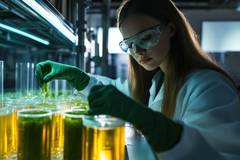
- Industry news
Industry news
- Category news
Category news
- Reports
- Key trends
- Multimedia
- Journal
- Events
- Suppliers
- Home
- Industry news
Industry news
- Category news
Category news
- Reports
- Key trends
- Multimedia
- Events
- Suppliers
Alfa Laval backs transatlantic biotech partnership for scalable food innovation
Key takeaways
- Alfa Laval supports a partnership between the Danish Technological Institute and North Carolina State University to accelerate food production innovation.
- The initiative uses precision and biomass fermentation to create nutritious, functional foods.
- By connecting Denmark’s and North Carolina’s biotech hubs, Alfa Laval fosters an ecosystem involving academia, industry, and policymakers.

Alfa Laval, a Sweden-based provider of heat transfer, separation, and fluid handling technologies, has revealed its support for a new transatlantic collaboration between the Danish Technological Institute in Denmark and North Carolina State University in the US.
The agreement aims to accelerate innovation in food production with a radically lower environmental impact through bioprocessing. It also marks a significant milestone connecting two of the world’s most dynamic biosolution hubs, Denmark and North Carolina.
The memorandum of understanding was signed on September 23, during an event at the Consulate General of Denmark in New York as part of Climate Week NYC, with the chairman of the Danish Government’s Growth Team for the Future of Agri-Food and Biosolutions, Kristian Hundebøll, in attendance.
Unlocking bioprocessing potential
Alfa Laval’s Food & Water Division, headquartered in Copenhagen, engages in this initiative alongside Danish companies to foster collaboration with like-minded businesses, academic institutions, and policymakers in North Carolina.
The strategy behind the move is to unlock the full potential of bioprocessing, including precision fermentation and biomass fermentation, to develop nutritious and healthy functional foods. Alfa Laval specializes in leveraging technology to enable the responsible use of natural resources, reduce environmental impact on industrial processes, improve energy efficiency, heat recovery, water treatment, and reduce emissions across industries.
According to Alfa Laval, these technologies can help combat noncommunicable diseases, reduce environmental impact, and address malnutrition by enriching food with nutrients, flavor, and appeal.
“Biotech is reshaping the way we produce food and medicine,” says Sammy Hulpiau, president of Alfa Laval’s Food & Water Division.
“It is a strong enabler for reducing the environmental impact of the global food system and for building health resilience into an ageing global population. By linking the innovation ecosystems of Denmark and North Carolina, we are creating a platform for real breakthroughs to produce secure, safe, and nutritious food.”
“This collaboration reflects our commitment to scalable, science-driven solutions for the greater good.”
Creating a robust ecosystem
Alfa Laval’s Food & Water Division has a long history of engaging with partners across academia, industry, and government to drive a shared vision of accelerating innovative solutions globally for nutrition and health.
This collaboration marks another significant step with the recently announced new Food Application & Innovation Centre in Copenhagen. It will support food producers in developing new foods and scaling them to industrial production for a growing global population while minimizing environmental impact.
North Carolina is recognized as a leading hub for biotechnology with a robust ecosystem of research, innovation, and talent. Its unique combination of academic excellence and industrial infrastructure makes it a strategic location for biotech development and investment.











